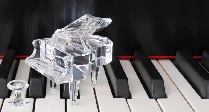I have spent a lifetime not only making music and teaching it, but also studying about what other people have written about music, about how to learn, about the history of composers and performance practice and the world in which certain pieces were written, what the composers themselves said about practice. Here are some of my favorite quotes about music and music-making. They are for purposes of encouragement. They are for purposes of information. And some of them are just for fun.

- According to a study published in the Hearing Journal that tracked adults 60 to 85 years old, those without any musical experience improved processing speed and memory after just three months of 30-minute piano lessons and three hours of practice each week. But there's good news for those who have played music earlier in life too. The cognitive and neural benefits of musical experience continue throughout life. It may even counteract negative effects of aging.Renew Magazine by UnitedHealthcare

- Pablo Casals' reply, when he was 84, to the question of why he continued to practice four hours a day. 'I keep practicing because I believe I am making progress.'
-

There is additional evidence that as we age, participating in the arts has a profound affect not only on our quality of life, but on our biology too. There's a correlation between music participation and the body's production of human growth hormone (hGH). In one study, 61 older adults in a group piano class showed a dramatic increase in hGH levels (hGH is implicated in such aging phenomena as osteoporosis, energy levels, wrinkling, muscle mass … and a decrease in anxiety, depression … )The Practice of Practice 
- Many pianists, including me, suffer from some high-frequency hearing loss, which may be associated with years of practicing pianos in small rooms. An audiologist had once told me that I would be surprised if I knew how many well known pianists, and instrumentalists of all kinds, still manage to continue their careers despite some playing-related hearing loss.Speaking the Piano
-

A neuroscientist once told me that there is not much that's more demanding for the brain than playing virtuoso piano music.from Speaking the Piano 
- When people ask me now if I miss coaching UCLA basketball games, the national championships, the attention, trophies, and everything that goes with them I tell them this: I miss the practices. I don't miss the games or the tournaments or all the other folderol… It is the practices I miss most even now.The Wisdom of Wooden
-

I have always loved sports, athletics, they have been an important part of my life. But music is athletics, a sport more difficult and fascinating than any I have ever played. There is enough teamwork and split second coordination in any symphony concert to fill up a dozen Superbowls.
The challenge of teaching, coaxing, and tricking the muscles of my hands and arms into moving faster than they think they can move is even more absorbing than the many challenges of sports which have interested me for so long. There seem to be so many more kinds of problems in music, and so many more ways to work on them. It is a limitless field for thought, invention and experiment.Never Too Late

- The musician, a small-muscle athlete, isn't just a big athlete in miniature. No other activity in which we engage requires the accuracy, speed, timing, smoothness, or coordination of muscular contraction exhibited in finished musical performance.Tone Deaf and All Thumbs

- Contrary to the old saying that you can't teach an old dog new tricks, research is proving that our ability to learn new things continues unabated to the end. The brain retains its plasticity throughout life. The stack of research on cognition and aging keeps growing, each new study chiming in with the same refrain: use it or lose it.The Practice of Practice
-

All it takes is work. Complex skills and absolute reliability demand more time and greater concentration during the learning process, but the potential for improvement is still a property of the wiring. Virtuosity is no big deal, if you don't mind practicing.Tone Deaf and All Thumbs -

The idea that practice isn't fun - I don't believe that is true and I'm not alone. Every professional musician I've spoken with said that practice is quite enjoyable - Sure practice can be challenging and frustrating and effortful, but at the same time it's engaging and often a lot of fun-Jazz trumpeter Don Cherry says - 'There is nothing more serious than having fun.'The Practice of Practice -

'When words fail, music speaks.'Hans Christian Andersen -

Music is what happens when language has become inadequate. -

Embrace repetition: Embracing repetition means changing your mind set; instead of viewing it as a chore, view it as your most powerful tool. As the martial artist and actor Bruce Lee said, 'I fear not the man who has practiced ten thousand kicks once, but I fear the man who has practiced one kick ten thousand times.' 
- Hans Jensen is a world-renowned cello teacher whose students earn top spots in orchestras and competition worldwide. When I asked Hans how his students learn to practice he said, 'I show them. I practice with them.' He's not alone. Musician, educator, and researcher Bob Duke from the University of Texas at Austin is very direct about the role of private music teachers. He said 'The reason for lessons is to learn how to practice. And that's it.'The Practice of Practice
-

Imagining a musical result is an authentic form of practice. Liszt said, 'Think 10 times and play once.'The Practice of Practice -

'Fast is fine, but accuracy is everything.'Wyatt Earp, Lawman
from The Practice of Practice -

'Don't look for the big, quick improvement. Seek the small improvements one day at a time. That's the only way it happens-and when it happens, it lasts.'John Wooden
from The Wisdom of Wooden 
- I am an advocate of lifelong learning-nothing is so enriching as music. Perhaps this is because it appeals to so many different parts of one's self: physical, emotional, intellectual and spiritual.Speaking the Piano
-
SCIENCE SHOWS HOW PIANO PLAYERS' BRAINS ARE ACTUALLY DIFFERENT FROM EVERYBODY ELSES'… By Jordan Taylor Sloan… Like Mic on Facebook: we've already written about what makes guitarists' and drummers' brains unique, but playing keys is an entirely different beast. Drums are functionally pitchless and achordal, so pitch selection and chord voicing aren't part of the equation. Guitar only allows for six notes at once and heavily favors left-hand dexterity.

But piano is the ultimate instrument in terms of skill and demand: Two hands have to play together simultaneously while navigating 88 keys. They can play up to 10 notes at a time. To manage all those options, pianists have to develop a totally unique brain capacity-one that has been revealed by science.
In most people, the depth of the brain's central sulcus is either deeper on the right or on the left side, which then determines which hand is dominant. But when scientists scanned the brains of pianists, they found something different: Pianists had a demonstrably more symmetrical central sulcus than everyone else. Already, then, pianists are able to make their brains into better-rounded machines. But it turns out the heavy-tax of piano playing makes their minds efficient in every way. 
- Perfection is what you are striving for, but perfection is an impossibility… However, striving for perfection is not an impossibility. Do the best you can under the circumstances that exist.The Wisdom of Wooden
-

SIGN IN DODGE CITY SALOON 1880… Please do not shoot the pianist. He is doing his best. -

MUSICOPHILIA: With the development of brain imaging in the 1990's, it became possible to actually visualize the brains of musicians and to compare them with those of nonmusicians. Using MRI morphometry, Gottfried Schlaug at Harvard and his colleagues made careful comparisons of the sizes of various brain structures. In 1995, they published a paper showing that the corpus callosum, the great commissure that connects the two hemispheres of the brain, is enlarged in professional musicians. Schlaug et al. went on to show increased volumes of gray matter in motor, auditory, and visuospatial areas of the cortex, as well as in the cerebellum. Anatomists today would be hard put to identify the brain of a visual artist, a writer, or a mathematician but they could recognize the brain of a professional musician without a moment's hesitation.

How much, Schlaug wondered, are these differences a reflection of innate predisposition and how much an effect of early musical training? One does not, of course, know what distinguishes the brains of musically gifted four-year-olds before they start musical training, but the effect of such training, Schlaug and his colleagues showed, are very great: the anatomical changes they observed with musician' brains were strongly correlated with the age at which musical training began and with the intensity of practice and rehearsal.

Alvaro Pascual-Leone at Harvard has shown how rapidly the brain responds to musical training. Using five-finger piano exercises as a training test, he has demonstrated that the motor cortex can show changes within minutes of practicing such sequences. Measurements of regional blood flow in different parts of the brain moreover, have shown increased activity in the basal ganglia and the cerebellum as well as various areas of the cerebral cortex-not only with physical practice, but with mental practice alone.

